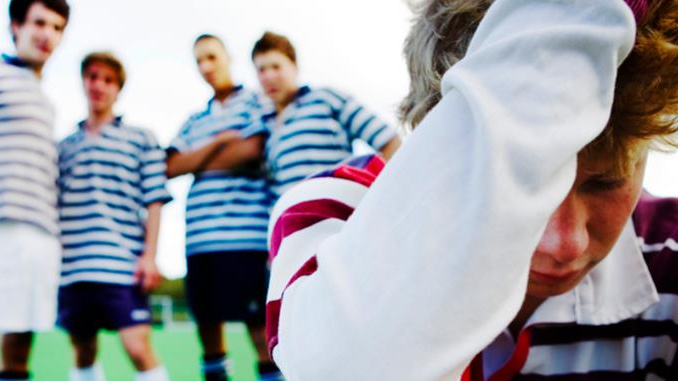Bullying made sport headlines when Richie Incognito of the Miami Dolphins was suspended indefinitely due to allegations of misconduct related to the bullying of his teammate Jonathan Martin. Unfortunately, bullying in sports is not a rare occurrence and happens not just in the big leagues; bullying can begin as early as the youth sports level. In general, bullying occurs when an individual or a group intentionally and repeatedly causes hurt or harm towards another group or individual. Particularly in sports teams and groups, we can see bullying happen in the form of hazing; when team members force rituals or harass rookie members as a way of initiating or accepting them into the group. The severity of which can range from taunting to actual physical violence. These actions can have a detrimental effect on a child; bullying has been linked as a risk factor for adolescent depression and suicide. Looking at bullying in school-aged children, nearly one-third or 13 million students, are bullied each year. Sadly most of these victims are not alerting an adult or seeking help evidenced by a 2010 study that showed 64% of children of whom were bullied did not report it. Bullying can present in the following ways:
- Verbal (taunting, teasing, name calling, threats)
- Social (spreading rumors, leaving someone out of a group)
- Physical (spitting, tripping, kicking, gestures)
- Cyber (bullying done online via chat, text message, social media)
Whatever the form of bullying, however minor or major the incident, whomever the aggressor may be, there should be no tolerance of bullying towards any person.
When it comes to bullying in sports, it can happen for a variety of reasons. Teammates may bully an athlete because of his or her race, gender or religious background. Bullying can also happen when an athlete is perceived as coaches’ favorite or if a player is excelling. It can also happen in the reverse scenario, when a playing is not performing well, or makes a mistake. The list of motivations for bullying is long, but bullying can still be prevented. Parents can play a major role in preventing not only their child from being bullied, but other children from being bullied, as well. Here’s a look at how parents can help identify when bullying is happening and how to prevent it:
1. Communicate regularly with your child about their sport and activities. Ask your child how practice is going so you can become familiar with your child’s teammates and the normal ongoings of the team.
2. Look at your child. Don’t just listen but observe your child’s behavior when talking about practice and their teammates. Understand what your child’s normal mannerism are. This will better equip you to notice if you child starts to act differently when talking about their activities, alerting you to a potential concern.
3. Know your child’s grades. Victims of bullying may lose self esteem and may see a decline in academic performance. Be familiar with your child’s academic performance; don’t just glance at a quarterly report card, know how your child is performing on their weekly quizzes and tests so you can notice any irregularities.
4. Make note of your child’s physical health. Victims of bullying may also experience physical symptoms like headaches and stomachaches. Keep an eye out for these subtle physical signs.
5. Talk to your child about bullying before enrolling in sports. Explain to your child what bullying is and what it could look like before they step onto the field or court. Let your child know that these behaviors or actions are not acceptable. Reinforce that they can seek you out for help or advice if they feel bullied, or feel someone on their team may be being bullied.
6. Ask their coach how bullying is being handled. As always, it’s important to maintain a friendly ongoing relationship with your child’s coach. Broach the subject of bullying with their coach and ask how it is or will be handled on the team. You should know when the coach plans to discuss the team bullying policy and what the repercussions are for bullying other athletes, umpires or other sports staff.
7. Report suspicions of bullying to the coach. If you might suspect that bullying is happening to your child or to someone else on their team, raise your concerns early with their coach. Bring as much specific information as possible to their coach including when it started, examples of the bullying (is it verbal, physical, etc.), who is involved. Equipping your coach with this information will bring them not just awareness but better guidance on what to keep an eye out for on their team.
8. Reinforce the coach and school’s policies regarding bullying. Support the coaches’ bullying policy and if applicable, the school’s policy. Understandably, supporting these policies can be difficult especially when your child is the athlete expressing aggressive behavior. Know that your support for anti-bullying will help your child develop into a better player, teammate and person as they mature and become a young adult.
9. Support your child developing a relationship with their coach or an adult involved in the sport. In the event your child does not feel comfortable raising bullying issues with you, it’s important to encourage your child to communicate regularly with someone directly involved in their activity. This could be their team coach, private coach, trainer, nurse, assistant coach, or someone in the athletic department. Having an adult they can confide in can help an athlete feel more comfortable sharing information about potential bullying issues.
How useful was this post?
Click on a star to rate it!
Average rating 0 / 5. Vote count: 0
No votes so far! Be the first to rate this post.



